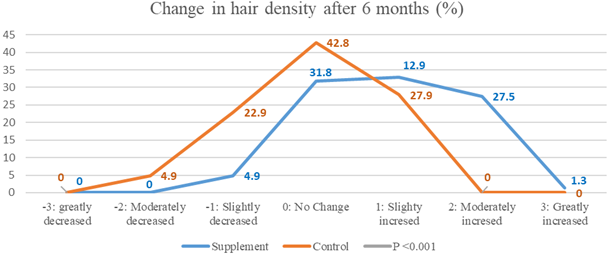Efficacy and Safety of Omega 3 Fatty Acid in the Treatment of Telogen Effluvium in Middle Aged Women
Abstract
Background: Omega-3 fatty acids (omega-3 FA) are constituents of the membranes of all cells in the body and are precursors of locally produced hormones, eicosanoids, which are important in the prevention and treatment of various diseases, especially in women. Telogen effluvium (TE) is one of the most common causes of diffuse non scarring hair loss. In its acute form, it generates a lot of anxiety in the patient, which can be significantly allayed with a confident diagnosis. Objectives: The aim of this study is to assess the Efficacy and safety level of omega 3 fatty acid in the treatment of telogen effluvium in middle aged women. Methods: This is an observational study. This study was carried out on 120 female patients attended in the Department of Dermatology, Shaheed Ziaur Rahman Medical College Hospital, Bogura, Bangladesh. The duration of the study period from January 2021 to December 2021. The period from Data was entered in MS Excel and Statistical analysis was done using SPSS-24. Results: A total of 120 patients, were evaluated prospectively. The baseline characteristics of women (Control) age, BMI, Telogen hair were 45.3±14.3, 19.8±2.5, 21.1±3.4. And (with supplement age, BMI, telogen hair were 47.6±10.2, 20.9±2.3, 20±4.1) Conclusion: Telogen effluvium, which commonly impacts women, begins suddenly with or without a recognizable initiating factor. It may be distinguished from traditional acute telogen effluvium by using its long fluctuating course.
Downloads
References
Zanzottera F, Bizzaro G, Michelotti A, Nobile V. Efficacy of a nutritional supplement, standardized in fatty acids and phytosterols, on hair loss and hair health in both women and men. J Cosmo Trichol. 2017;3(121):2.
Lin RL, Garibyan L, Kimball AB, Drake LA. Systemic causes of hair loss. Annals of medicine. 2016 Aug 17;48(6):393-402.
Rinaldi F, Marzani B, Pinto D. Evaluation of Tolerance and Trichological Efficacy of a Food Supplement in Men and Women with Telogen Effluvium-Like Disorder. Cosmetics. 2022 Dec 7;9(6):135.
Grover C, Khurana A. Telogen effluvium. Indian journal of dermatology, venereology and leprology. 2013 Sep 1; 79:591.
Whiting DA. Chronic telogen effluvium: increased scalp hair shedding in middle-aged women. Journal of the American Academy of Dermatology. 1996 Dec 1;35(6):899-906.
Liyanage D, Sinclair R. Telogen effluvium. Cosmetics. 2016 Mar 25;3(2):13.
Hughes, E.C. and Saleh, D., 2017. Telogen effluvium.
Goluch-Koniuszy ZS. Nutrition of women with hair loss problem during the period of menopause. Menopause Review/Przegląd Menopauzalny. 2016 Mar 29;15(1):56-61.
Trüeb RM. Oxidative stress in ageing of hair. International journal of trichology. 2009 Jan;1(1):6.
Qi J, Garza LA. An overview of alopecias. Cold Spring Harbor perspectives in medicine. 2014 Mar 1;4(3): a013615.
MOHD-SETAPAR HM. Natural ingredients in cosmetics from Malaysian plants: a review. Sains Malaysiana. 2018;47(5):951-9.
Humbert, P., Binda, D., Robin, S. and Krutmann, J., 2011. Beauty from inside: nutrition- based strategies in cosmetic dermatology. Nutrition for Healthy Skin: Strategies for Clinical and Cosmetic Practice, pp.189-196.
Liang T, Liao S. Inhibition of steroid 5 α-reductase by specific aliphatic unsaturated fatty acids. Biochemical Journal. 1992 Jul 15;285(2):557-62.
Le Floc'h C, Cheniti A, Connétable S, Piccardi N, Vincenzi C, Tosti A. Effect of a nutritional supplement on hair loss in women. Journal of cosmetic dermatology. 2015 Mar;14(1):76-82.



























